高考英语专题总复习 常用句型归纳
高考英语180个重点句型

2021高考英语一轮复习180个重点句型一定要学会1. That is the reason whyI'm not in favour of revising the plan.这就是我不赞成修正这个计划的原因。
【句型分析】why I'm not in favour of revising the plan做the reason 的定语从句。
2. His failure was due to the fact that he had not practised for a long time.他的失败是由于他没有练习很长时间。
【句型分析】that he had not practised for a long time做the fact的同位语从句。
3. It is likely that it will rain in the evening.可能晚上会下雨。
【句型分析】It做形式主语,主语从句that it will rain in the evening 做真正主语。
4. How they went to America is what I want to know.他们如何到的美国是我想知道的事情。
【句型分析】How they went to America是主语从句,在整句话中做主语;what I want to know是表语从句,在整句话中做表语。
5. It occurred to him that he had left his key at home.他突然想起把钥匙落在了家里。
【句型分析】It做形式主语,that he had left his key at home主语从句做真正主语。
6. The reason why he came late was that he didn't catch the early bus. 他迟到的原因是他没有赶上早班车。
高考英语常用句型归纳整理

高考英语常用句型归纳整理一、议论文常用句型:1. It is widely believed that + 句子(普遍认为……)例句:It is widely believed that education plays a crucial role in the development of an individual.2. A lot of people think/argue/believe that + 句子(很多人认为……)例句:A lot of people argue that technology has made our lives easier and more convenient.3. There is no doubt that + 句子(毫无疑问……)例句:There is no doubt that climate change is one of the most pressing issues we are facing today.4. Many people hold the opinion/view that + 句子(许多人认为……)例句:Many people hold the opinion that social media has had a negative impact on interpersonal relationships.5. Some people claim/argue/suggest that + 句子(一些人声称……)例句:Some people suggest that governments should impose higher taxes on the rich to reduce income inequality.6. It goes without saying that + 句子(不言而喻……)例句:It goes without saying that smoking is harmful to our health.7. From my point of view/perspective, + 句子(从我的观点来看……)例句:From my point of view, everyone should have equal access to education.8. Personally, I believe/feel that + 句子(个人而言,我相信……)例句:Personally, I believe that learning a foreign language can broaden our horizons.9. In my opinion, + 句子(在我看来……)例句:In my opinion, it is important for young people to develop good reading habits.10. As far as I am concerned, + 句子(就我而言……)例句:As far as I am concerned, it is crucial for us to protect theenvironment for future generations.二、说明文常用句型:1. First and foremost, + 句子(首先……)例句:First and foremost, we need to address the issue of poverty in our society.2. Another important factor/aspect/reason is that + 句子(另一个重要因素是……)例句:Another important factor is that technology has made communicationfaster and more convenient.3. Furthermore, + 句子(此外……)例句:Furthermore, the Internet has revolutionized the way we access information.4. Moreover, + 句子(此外……)例句:Moreover, social media has become a powerful tool for sharing ideas and connecting with others.5. Additionally, + 句子(此外……)例句:Additionally, research has shown that regular exercise can improve both physical and mental health.6. On top of that, + 句子(除此之外……)例句:On top of that, globalization has led to an increase in cultural exchange and understanding.7. Apart from that, + 句子(除此之外……)例句:Apart from that, studying abroad can provide students with valuable international experiences.8. Last but not least, + 句子(最后但同样重要的是……)例句:Last but not least, we should strive for equality and justice in our society.9. In addition, + 句子(此外……)例句:In addition, technology has changed the way we work and communicate.10. Finally, + 句子(最后……)例句:Finally, we need to take immediate action to address the issue ofclimate change.三、记叙文常用句型:1. Once upon a time, + 句子(从前有一次……)例句:Once upon a time, there was a little boy who lived in a small village.2. I still remember the day/moment when + 句子(我仍然记得……的那一天/时刻)例句:I still remember the day when I won my first writing competition.3. It was a bright/sunny day + 时间状语从句(那是一个晴朗的一天)例句:It was a bright summer day when I first visited the beach.4. It was a dark and stormy night + 时间状语从句(那是一个漆黑的暴雨之夜)例句:It was a dark and stormy night when I got lost in the forest.5. As I walked along the street, + 句子(当我沿着街走的时候……)例句:As I walked along the street, I noticed a stray dog following me.6. Suddenly, + 句子(突然……)例句:Suddenly, I heard a loud noise coming from the kitchen.7. I couldn't believe my eyes/ears when + 句子(当……时,我简直不敢相信我的眼睛/耳朵)例句:I couldn't believe my eyes when I saw my favorite singer at the concert.8. Little did I know/realize that + 句子(我并不知道/意识到……)例句:Little did I know that my life was about to change forever.9. It was the best/worst day/moment of my life when + 句子(那是我生命中最美好/最糟糕的一天/时刻)例句:It was the best day of my life when I got accepted into my dream university.10. Looking back on that day/moment, + 句子(回想起那一天/时刻……)例句:Looking back on that day, I realize how much I have grown since then.以上是高考英语常用句型的归纳整理,希望对你的学习有所帮助。
高考英语重点句型归纳
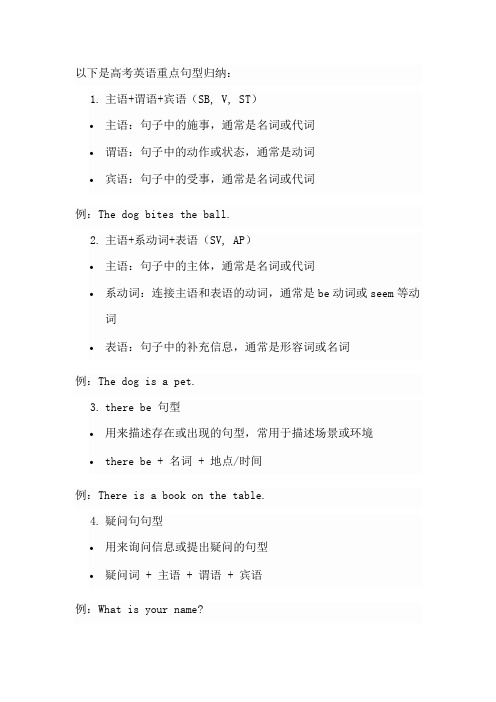
以下是高考英语重点句型归纳:1.主语+谓语+宾语(SB, V, ST)•主语:句子中的施事,通常是名词或代词•谓语:句子中的动作或状态,通常是动词•宾语:句子中的受事,通常是名词或代词例:The dog bites the ball.2.主语+系动词+表语(SV, AP)•主语:句子中的主体,通常是名词或代词•系动词:连接主语和表语的动词,通常是be动词或seem等动词•表语:句子中的补充信息,通常是形容词或名词例:The dog is a pet.3.there be 句型•用来描述存在或出现的句型,常用于描述场景或环境•there be + 名词 + 地点/时间例:There is a book on the table.4.疑问句句型•用来询问信息或提出疑问的句型•疑问词 + 主语 + 谓语 + 宾语例:What is your name?5.祈使句句型•用来表示请求、命令或建议的句型•动词原形 + 其他成分例:Please close the door.6.强调句型•用来强调句子中的某个成分,常用于强调名词、动词、形容词或副词•It is/was + 被强调部分 + that + 其他部分例:It was yesterday that I saw the movie.7.从句句型•用来连接句子或从句子中分离出来的部分,常用于补充信息或修饰主句•从句通常由连接词引导,可以是名词性从句、定语从句或状语从句例:The book that I borrowed from the library is very interesting.(定语从句)。
成人高考英语常用句型总复习

her a place at the university.
A. earned B. received
C. accepted D. offered
9) As is reported(据报道), every means
____ practical and everything _____
well in the experiment.
____ .
A. offer us tea
B. offer tea us
C. offering us tea D. offered tea 22
6) They’ve ____ us £150,000 for the
house. Shall we take it?
A. provided
B. supplied
is wrong?
A. you well
B. you good lucky
C. you successful D. good luck to you25
提示:good luck to sb 祝某人平安
9
(二)并列句
由并列连词把两个或两个以上的简单句连 在一起的句子,叫并列句。
常用的并列连词有:and, but, or, so, yet, for, either...or..., not only...but also..., neither...nor等。
The car broke down, so we had to find a telephone.
这个可怜的人不仅被逮捕,而且还被送进 了监狱。
提示:not only... but also... 用于句首时,
主句需要部分倒装,即:把助动词、情态 11
高考英语专项知识点归纳总结
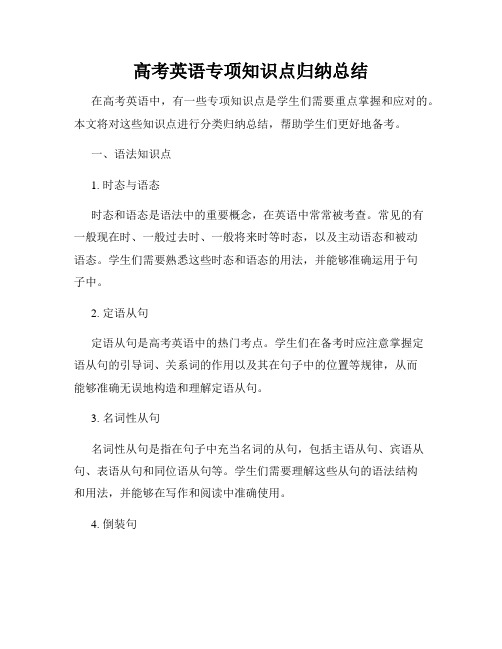
高考英语专项知识点归纳总结在高考英语中,有一些专项知识点是学生们需要重点掌握和应对的。
本文将对这些知识点进行分类归纳总结,帮助学生们更好地备考。
一、语法知识点1. 时态与语态时态和语态是语法中的重要概念,在英语中常常被考查。
常见的有一般现在时、一般过去时、一般将来时等时态,以及主动语态和被动语态。
学生们需要熟悉这些时态和语态的用法,并能够准确运用于句子中。
2. 定语从句定语从句是高考英语中的热门考点。
学生们在备考时应注意掌握定语从句的引导词、关系词的作用以及其在句子中的位置等规律,从而能够准确无误地构造和理解定语从句。
3. 名词性从句名词性从句是指在句子中充当名词的从句,包括主语从句、宾语从句、表语从句和同位语从句等。
学生们需要理解这些从句的语法结构和用法,并能够在写作和阅读中准确使用。
4. 倒装句倒装句是英语中的一种特殊句式,常常用于强调或者表达特定的语气。
学生们需要熟悉倒装句的结构和应用场景,并能够准确运用于写作和阅读中。
二、词汇和表达1. 同义词和近义词学生们需要通过大量的阅读和积累来掌握同义词和近义词的用法和区别。
这些词汇的掌握将有助于学生们丰富词汇量并提高写作能力。
2. 短语和固定搭配短语和固定搭配在阅读理解和写作中常常出现,学生们需要通过课外阅读和背诵来熟悉各种短语和固定搭配的用法,并能够准确地使用于句子中。
3. 熟词生义和生词熟义在高考英语中,有时会出现熟词生义和生词熟义的情况,这就需要学生们对单词的多义性和用法进行深入了解。
定期复习和练习是掌握这些词汇的有效方式。
三、阅读技巧1. 快速阅读在阅读理解中,时间是有限的,学生们需要通过提高自己的阅读速度来应对答题压力。
快速阅读技巧的掌握将有助于学生们更好地理解文章内容并准确回答问题。
2. 信息获取在阅读理解中,学生们需要能够准确地获取信息并做出判断。
通过学习相关的阅读技巧,例如扫读和略读,学生们能够更快速地获取所需信息,提高答题准确率。
高中英语常用短语和句型归纳总结(完整版)
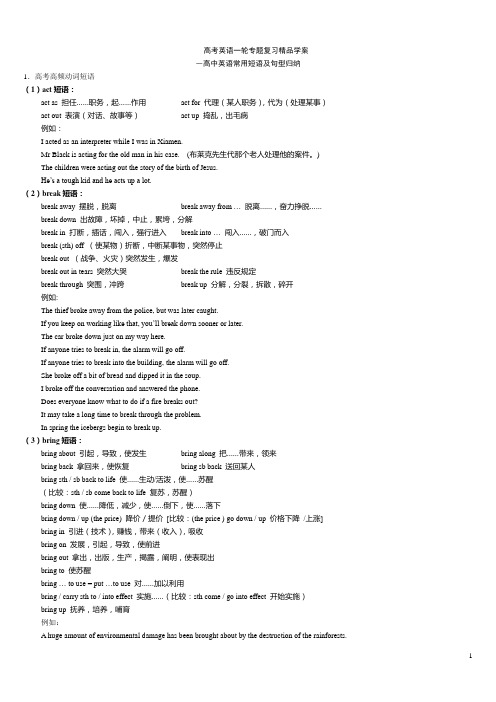
高考英语一轮专题复习精品学案―高中英语常用短语及句型归纳1.高考高频动词短语(1)act短语:act as 担任……职务,起……作用act for 代理(某人职务),代为(处理某事)act out 表演(对话、故事等)act up 捣乱,出毛病例如:I acted as an interpreter while I was in Xiamen.Mr Black is acting for the old man in his case. (布莱克先生代那个老人处理他的案件。
)The children were acting out the story of the birth of Jesus.He’s a tough kid and he acts up a lot.(2)break短语:break away 摆脱,脱离break away from …脱离……,奋力挣脱……break down 出故障,坏掉,中止,累垮,分解break in 打断,插话,闯入,强行进入break into …闯入……,破门而入break (sth) off (使某物)折断,中断某事物,突然停止break out (战争、火灾)突然发生,爆发break out in tears 突然大哭break the rule 违反规定break through 突围,冲跨break up 分解,分裂,拆散,碎开例如:The thief broke away from the police, but was later caught.If you keep on working like that, you’ll break down sooner or later.The car broke down just on my way here.If anyone tries to break in, the alarm will go off.If anyone tries to break into the building, the alarm will go off.She broke off a bit of bread and dipped it in the soup.I broke off the conversation and answered the phone.Does everyone know what to do if a fire breaks out?It may take a long time to break through the problem.In spring the icebergs begin to break up.(3)bring短语:bring about 引起,导致,使发生bring along 把……带来,领来bring back 拿回来,使恢复bring sb back 送回某人bring sth / sb back to life 使……生动/活泼,使……苏醒(比较:sth / sb come back to life 复苏,苏醒)bring down 使……降低,减少,使……倒下,使……落下bring down / up (the price) 降价/提价[比较:(the price ) go down / up 价格下降/上涨]bring in 引进(技术),赚钱,带来(收入),吸收bring on 发展,引起,导致,使前进bring out 拿出,出版,生产,揭露,阐明,使表现出bring to 使苏醒bring … to use = put …to use 对……加以利用bring / carry sth to / into effect 实施……(比较:sth come / go into effect 开始实施)bring up 抚养,培养,哺育例如:A huge amount of environmental damage has been brought about by the destruction of the rainforests.You’re welcome to bring along a friend.The government hopes these measures will help to bring down inflation (通货膨胀).American country music brings in more than $10 billion each year.This new kind of technology was brought in in the early 1980s.Stress can bring on (=lead to / result in) headaches and other illnesses.Jenny opened the cupboard and brought out a couple of bottles.He was brought up by his grandparents.(4)call短语:call at (sp) 访问(某地),拜访(某地)[比较:call on (sb) 拜访(某人),访问(某人)] call back 回电话call for 提倡,号召,要求,需要,去接某人,接走某人call / shout for help 呼救call in 请来,召集,来访,打电话call off 取消call on / upon 号召call out 大声呼喊,叫喊call sb…for short简称某人……call sb names 谩骂某人call up 给……打电话,使人想起,号召例如:We called at Mike’s house yesterday.All ships sailing on the oceans call for help by radio in English.I’ll call for my uncle at Beijing Railway Station.Let’s call in a doctor for the little girl.Many of these songs called on / upon the workers to take up the struggle.I shall call on him tomorrow.I heard somebody calling out to me from downstairs.Call me up tomorrow; my number is 536291.Your letter calls up the days when we worked together fifteen years ago.Due to the bad weather, the sports meeting has been called off.(5)come短语:come about 发生,产生come across 偶然相遇come along 来,随同,进展,加油come at …向……袭击come back 回来,想起来,复活come down 下来,下落,传下come down to…到达,从一处来到另一处come for…来拿,来取 come from…来自,出生于come in 进来,进入come into being 形成,产生come into use 使用起来come off 脱落,从……离开come on 过来,跟我来,加油,来吧,赶快come on / upon sb / sth 偶然遇见,偶然碰上,偶然发现come out 露出,出来,出现,出版,发(芽),(花)开come over to…过来,顺便来访,从一个地方来到另一个地方come round / around (非正式)来访,串门come to …来到,出现,提及,达到,共计,结果是,苏醒come to an end 结束,终止come to know 逐渐地知道come to life (变得)活泼,苏醒过来c ome to light 显露,为人所知come to oneself 苏醒过来,恢复知觉come to / into power 当权,上台come / go to ruin = fall into ruin 变成废墟come to terms with…甘心忍受come true 变为现实,成为事实come up 被提出,上来,走来,上升,抬头,长出来come up to sb 朝某人走来come up with …提出,想出(主意),找出(答案),赶上例如:A number of educational reforms have come about as a result of the report.I came across an old friend of mine in the street the other day.Your English is coming along really well.Come along / on! Don’t give up yet!Come along / on! We’re all waiting for you!Suddenly, he came at me with a knife.Now, let’s come back to what I was saying a moment ago.It is impossible for a dead animal to come back.Snow was coming down so thickly that I could hardly see through the window.The airplane came down in that field.Where does the film star come from, do you know?Mr Smith came in in a hurry, book in hand (= with a book in his hand).The law first came into being in 1912.By the time he came to / into power in 1951, he was already seventy.How long is it since the electronic computer came into use?The button came off, but he didn’t notice it.There is no doubt that the truth will come out one day.The trees turn green and flowers come out.This magazine comes out once a month.Why don’t you come around / round for lunch?Some day you’ll come to know the mistakes you have made.If they don’t come to a decision by midnight, the talks will be abandoned.I’ve forgotten her name, but maybe it’l l come to me later.The bill came to £480 in total.His dream of becoming a film star came true at last.A child came up to me and showed me the way.The same problems came up at the meeting yesterday.They came up with the same problems at the meeting yesterday.Searching through the drawer, I came upon the letter I’d been looking for. (6)cut短语:cut away 切除,剪去cut down 砍倒,砍下,削减cut in 插嘴,加塞,插入cut in line 插队cut … into pieces / halves 把……切成碎片/切成两半cut off 切断(线路),中断(供应)cut out 删除,剪下来cut the cost of …降低……的成本 cut up 切碎,剪碎,剁碎,齐根切掉例如:He cut away some branches, making it look more beautiful.A lot of trees there were cut down in the past.The electricity was cut off because of the storm.He was sentenced to death and had his head cut off the next day.Could you cut the pizza up, please?(7)do短语:do about 处理,应付do and don’t要与不要do a good deed 做一件好事do a lot of walking 走很多路do a test 做实验,做化验do a word puzzle 猜字谜do an experiment / experiments 做实验do away with 废除do body-building 做健身操do chores 处理琐事,干家务do housework 做家务活do make-up 化妆,打扮do observations 观察do one’s best 尽某人最大努力do one’s homework 做作业do research on…从事……研究工作do sb a favour 帮某人一个忙do sb honor = do honor to sb 礼遇某人,对某人表示敬意do sb the favour to do sth 帮某人一个忙做某事do some reading 读书,阅读,看点书do some shopping = go shopping 购物,买东西do sports = have / play sports = take exercise 进行体育运动,做运动,进行锻炼do sth in turn / by turns = take turns to do sth / in doing sth 轮流做某事do telephone interviews 进行电话采访do the laundry 洗衣服do up 打扮,梳妆,收拾,把(衣服,鞋子等)扣/系好do up one’s shoes / hair 系好鞋带/梳好头do up the button 扣纽扣do well / better in…在……方面干得好/更好do with 处理,处置,对付do wrong 做坏事,做错事(比较:do right = do the right thing 做得对)例如:To tell the truth, I don’t know how to do with him.I’ll have nothing to do with him from now on.What did you do with that camera you found?The poisonous waste may do great harm to the things around us.Eat more fruit; it will do good to you.I think I can do better in English this year than last year.Liszt said, “You’ve done wrong, but I can see you are truly sorry about it.”I’m going to do my best this year.I was only trying to do a good deed.(8)get短语:get a better understanding of China 更好地了解中国get a full mark / full marks 得满分get a lot of satisfaction 得到满足get at 意指,本意是get around = get about 四处走动,活动get away 移走,拿走,逃脱,逃离get away from 逃脱,逃离get back 回来,回家,取回,找回,退还get close to 接近get down 下来,降下get down on one’s knees 跪下get down to (doing) sth 开始(做)某事)get in 进入,收获,达到get in a word 插话get into…进入……get sb into…使某人陷入get it 接(电话),应(门),理解,懂得get off 下车,脱下(衣服等)get on 上车,过活get on / along with…进展,与……相处get on one’s feet (艰难地)站立起来get out 离开,出去get out of 逃避,避免get over 克服,恢复,原谅get up 起床,起身get across 理解,度过get through 接通(电话),完成(工作),通过(考试)get to 到达,抵达get to sleep 入睡,设法睡着get / gain / take possession of 占有,拥有,占领get ready for 为……做准备(比较:be ready for = be well prepared for = be in preparation for 为……做好了准备)get rid of 除掉,去掉get sb to do 让某人做get the idea for…想到……的主意get the message across 传播信息get together 相聚,碰头,联欢get / be used to sth 习惯于……,适应于……(比较:be used as sth 被用作……be used for sth 被用于……,用来做……be used to do sth 被用于做……used to do sth 过去常常做)get / be dressed 穿衣服get / be engaged (to sb) (与某人)订婚get / be lost 丢失了,迷路get / be married (to sb) = marry (sb) (与某人)结婚get / be stuck 陷进去,被困住,被难住,遇到困难get / be tired of 对……感到厌倦,对……失去兴趣(比较:get / be tired for 因……而感到疲倦)例如:I’m getting on well with my classmates now.How are you getting along with your English?He got the book away from her.The bank robbers used a stolen car to get away.When did you get back from the countryside?Have you got back the book you lent him?“Get down on your knees,” said the Genie, “for I am going to kill you.”The dust has got into my eyes.This mistake may get him into difficulties.Before I could get in a word he had measured me, and was giving orders for evening suits. If you knock into someone, or get into his way, you should say, “Excuse me.” or “I’m sorry.”When you are in London, you might get in touch with a friend of mine.The conductor got off and checked the rails.She got on her bicycle and cycled off.You work too hard! You should get out a bit more.If you don’t want to go, I suppose I can get rid of the ticket.We all try to get together at least once a year at Christmas time.It took us only four minutes to get through the Customs(海关).I telephoned him, but I just couldn’t get through to him.She felt so cold that she got close to her mother.It’s time we got down to work.The theatre was already full, and we couldn’t get in.The peasants are busy getting in the crops.We d idn’t get up until lunch time.He got up and walked over to the window.(9)give短语:give away 赠送,给予,背弃,泄露,分发give back 归还,送回give in 投降,让步,屈服give off 释放,发出,放出(烟、光、热等)give out 用完,耗尽,分发,发放give over = hand over 转交,移交give up 放弃,辞去give a concert 开音乐会give a description of…描述……give / make a speech 演讲,讲话give a talk 演讲,做报告give birth to 生婴儿,生产,造成give close attention to 密切关注give medical care to sb 对某人进行治疗give shade in summer 夏天时遮阳give / lend sb a hand 给某人帮助give sb a message = give a message to sb 给某人捎个口信give sb a second look 再看某人一眼give sb a warm welcome 热烈欢迎某人give sb some advice on sth / doing sth / how to do sth 就……向某人提出建议/忠告例如:In those days, he used to give away a part of his income to help his friend.Remember not to give it away to anyone else; it’s a secret.Both sides argued with reason, and neither would give in.If they are burned, they will give off poisonous gases.When they made ready to climb the next ridge (山脊), they found that their oxygen had given out.Our English teacher is giving out the test papers.Both the man and the horse gave out after the long ride.All hope of finding the missing aircraft was given up and the search stopped.Mary had to give up her job after her marriage.Mr Black will give us a talk on how to learn English well this afternoon.Could you give us some advice on reading?If you won’t have it changed, please give my money back.(10)go短语:go abroad 出国go about 四处走走,开始做,着手干go about from house to house 挨/逐家拜访go against 违反,违背go ahead 说吧,干吧,领先,走在前面go / walk around 四处走走go away 走开,离去go back 回去go beyond 超越go by 走过,经过,(时间)消逝,过去go down 下来,落下,倒下go down on one’s knees 跪下go for 为……去,努力获取,主张,适用于go for a hike = go hiking 去徒步旅行go for a job interview 去面试找工作go for a walk / walks 散步go for sb 对某人也一样go in for 参加,喜欢go into 详细调查go into details 细说go off 走开,离去,(闹钟)闹响go off to = be off to = leave for 动身去go off the air 停止广播(比较:go on the air 开始广播)go on 发生,进行,继续go / be on diet 在节食go on (a) holiday 去度假go on a tour to 去……观光(游览)go on a visit to 去……访问(参观)go on doing sth 继续做某事(同一事)[比较:go on to do sth 继续做某事(另一事)go on with sth 继续某事]go out 熄灭,出去,外出go over 复习,过一遍,仔细检查,审阅go past 从……的旁边过去go up 上升,上涨,增长,攀登go with…与……相配go without 忍受没有……之苦,没有……也行,没有……也能勉强应付go shopping / fishing / sailing / camping / skating 去购物/钓鱼/驾船航行/宿营/滑冰go straight along 沿着……一直往前走go through 通过,经受,浏览,仔细检查go through with 完成go to bed (上床)睡觉go to school / work 上学/上班go to sea 当水手go to sleep 入睡go to town 进城go to a movie 去看电影go to the country(side) 下乡go home / there 回家/去那儿go to see a doctor 去看病,去看医生 go bad 变坏go wrong 出毛病,不对头,做错事,误入歧途go Dutch 各付各的帐,平摊费用例如:No one dared to go against the rules.—Do you mind if I open the window? / Do you mind my opening the window?—No, go ahead.I went away /off wondering if I’d said anything wrong.I’m afraid the fish has gone bad.Things will get easier as time goes by.He went by quickly, taking no notice of us.If you really want the job, go for it!Close all the doors and lock them when you go out. The same goes for windows.I go in for all the competitions.After a short pause, Maria went on with her story.Suddenly the candle went out.Once again I went over exactly what I needed to say.Let’s go over what we learned last period.Do you want me to go through this and check your spellings?Unemployment in that country has gone up by a million.It is possible to go without food for a few days.Something’s gone wrong with my watch; I must have it repaired.(11)have短语:have a break 休息一下have a bright future 有一个灿烂的未来have (got) a cold / cough / headache / fever 感冒/咳嗽/头疼/发烧have a conversation with sb 与某人交谈[比较:have a dialogue with sb 与某人对话have a talk with sb (about sth) (就某事)与某人进行交流have a word with sb = would like a word with sb 和某人谈几句,跟某人说句话] have a gift for…对……有天赋(比较:have a reputation for…有……名誉/名声)have a good flight (坐飞机)旅途愉快have a good knowledge of …对……很熟悉,通晓……have a good laugh over…对……笑了个够have a good / great / wonderful time = have (great) fun 玩得(非常)高兴,过得愉快have a / the habit of …= be in a / the habit of…有……的习惯(比较:get into / form the habit of…养成……的习惯get sb into the habit of…使某人养成……的习惯)have a hit 风靡一时have a large population 人口众多have / take a look 看一看have a meeting / party 开会/举行晚会have a nice / pleasant trip / journey 祝旅途愉快have (got ) a pain (in the…)(身体某部位)痛have a part-time job 做兼职工作have a (good) rest 休息have / take a seat 坐下(比较:have / take one’s seat 坐某人的座位)have a stomachache 胃疼,肚子疼have a sweet tooth 喜欢吃甜食have a swim 游泳have a table tennis match 举行一场乒乓球比赛have a test 进行测验have a try 试一试have / show an appetite for…有……的欲望或爱好have / make an appointment with sb 和某人有预约, 和某人有约定have an effect on / upon…对……有影响,对……产生作用(比较:influence… = affect …对……有影响have no effect / influence on …对……没有影响have a good / bad effect on …对……有好/坏影响have a great / little effect on …对……有很大的影响/影响不大have a strong influence on…对……有很大影响)have / take an exam 参加考试have an eye for 有眼力,有眼光have an income of …有……的收入have access to …使用(接近……的)权利或机会have breakfast / lunch / supper 吃早饭/午饭/晚饭have lessons / classes 上课have mercy on…宽恕……,对……仁慈,对……表示怜悯have no chance of surviving 没有生存的可能性have no choice but to do sth 别无选择,只好做某事have none of …根本不理睬……have on 穿着have sth on sb 某人身上带着某物have / take one’s medicine 服药,吃药have some difficulty / trouble / problems with …在……有困难/麻烦事[比较:have some difficulty / trouble / problems (in ) doing sth 做某事有困难/麻烦]have something / nothing in common (with…) (与……)有共同点/没有共同之处(比较:have much / a lot in common with…与……有许多相同之处have little in common with…与……几乎没有相同之处)have something / nothing to do with …与……有关/无关have to = have got to 不得不,必须例如:Class is over. Let’s have a break.I’ve got a cough.Dad and I had a good laugh over that.They are having a good time.He stopped to have a look.We are going to have a table tennis match tomorrow afternoon.Are we going to have a meeting this week?Here is a tree. Let me have a rest.Are you going to have a swim?We’ll have a test tomorrow.Where is Peter? I want to have a word with him.Does she have lunch at home?Then it has no choice but to lie down and sleep.He knew about the order, he knew why the soldiers were there, but he would have none of it.We have four lessons in the morning and two in the afternoon.Most of his questions have nothing to do with his lessons.I noticed that he had on bedroom slippers.Please come here and have my seat, Granny.He hasn’t had any medicine.At three fifty in the afternoon we have sports.(12)hold短语:hold a meeting / party 开会/举行晚会hold back 退缩,踌躇,阻挡,控制住hold one’s breath屏息,不出气hold on 等一等,不要挂电话hold on to 抓住,保住hold out 伸出,坚持下去,维持hold up 阻挡,使停顿,举起,拿起,阻滞hold together 连在一起,团结一致例如:Anger flooded through her. She couldn’t hold it back.—Could I speak to Mr Smith? —Hold on, please.The little boy held out his hands.I think w ater supplies won’t hold out much longer.Sorry, I’m late. I was held up at work.(13)keep短语:keep away from 避开,别靠近keep back 隐瞒,忍住,阻止……向前,留下keep down 控制keep off 勿踏,勿踩keep off sb / sth 不接触或不接近某人/某事物keep on 继续进行keep out 不得入内keep…out 把……挡住,把……留在外面keep out of …不进入……keep up 继续,保持,坚持,使(情绪等)不低落keep up with… = catch up with…跟上,赶上keep a date 赴约keep a healthy diet 保持健康的饮食keep a record / records 保持记录keep an eye on 注视,留心,注意,照顾(比较:keep an eye out for 注视,留心,注意)keep busy doing 忙着做某事keep fit 保持健康keep…in mind =learn…by heart= remember…把……记住keep (on) doing sth 继续不停地做某事[比较:keep sb doing sth 使某人一直/继续做某事keep … from doing 阻止……做,不让……做stop / prevent… (from) doing 妨碍/预防/阻止……做,不让……做] keep one’s appointment 守约(比较:break one’s appointment 违约)keep one’s balance 保持平衡keep one’s word(s) 遵守诺言keep safe 保持安全keep silent over …对……保持沉默keep the same look 保持原貌keep watch 保持警戒,站岗例如:I would have been here sooner, but the rainstorm kept me back.Every week there was a rebellion(造反)somewhere, and the Austrian soldiers were kept busy hurrying from one town to another in order to put down the rebellions.While Leonov was outside the ship, he kept in touch by telephone with his companion and with the earth.He kept on telling us the same story over and over.You may depend on his doing what he says, for he is a person who always keeps his words.Danger! Keep out!Will this overcoat keep the rain out?It is also bad manners to keep silent when the teacher asks you a question.The rain kept up all night.I see you are getting along well with your English studies. Keep up the good work.The good news keeps our spirits up.He walked so fast that I could hardly keep up with him.Every few hundred meters along the wall there are watch-towers, where soldiers used to keep watch.There is a sign there saying, “Keep off the grass.”(14)knock短语:knock at /on 敲打(门、窗等)knock down 把……撞倒,击倒knock into 撞到,撞上某人,偶然碰见knock sb out (of sth) 淘汰某人knock over 撞翻,撞倒例如:We knocked at / on the door but there was no one there.He was in hospital last night after being knocked down by a car.Tom entered the classroom hurriedly and knocked into Mr. White.He almost knocked into me before he realized it.If no one answers the front door, try knocking at the back door.(15)look短语:look at 看着,注视,检查look at oneself in the mirror = admire oneself in the mirror 照镜子look after 照顾,照料,照看look ahead 向前看,展望未来look around / about 四处看看,四下环顾look back 回首,回忆,回顾过去look back on…回顾……,回忆……look forward to sth /doing sth 盼望,期盼某事物/做某事look for 寻找,找look in 来访,参观look into…往……里面看,浏览,调查,研究look (right) into sb’s eyes 直视着look like…看起来像……(比较:look the same 看起来像)look on 旁观,观望look out = be careful = take care 留神,当心,注意,警惕,提防look out for 警惕,留心,找出来look over…翻阅,(仔细)检查look through 看透,仔细查看,浏览,翻阅,温习look up 仰视,往上看,(在字典或参考书中)查阅,查寻look up to sb 敬仰,仰望,尊敬(比较:look down on / upon sb 瞧不起,鄙视,轻视)look / be worried 看上去/感到担心例如:The boy is old enough to look after himself.He spent two weeks in Shanghai, looking around / about the city.We are looking forward to hearing from you soon.Join us. Don’t just look on.They all looked on him as a member of their family.Look out! There is danger ahead.I shall look out that I don’t trust him again.He looked through his notes before writing the report.Look through these photographs and try to pick out the man you see.I must look up the time of your train.A fox came to the tree and looked up at the cock.I’ve always looked up to Bill for his courage and determination.(16)make短语:make into 制成,作成(后面跟产品,制成品)[比较:be made in 在……生产/制造be made of 由……组成/构成,用某种原材料制成(物理变化)be made from 由……组成/构成,用某种原材料制成(化学变化)be made up of = consist of 由……组成,由……构成]make out 理解,看清楚make up 化妆,打扮,和解,配制,编造,虚构,构成,组成make up for 弥补,补充,补偿made up o ne’s mind 下决心make a choice 做出选择make a commitment 承诺,保证make a comment / comments (on / upon…) (对……)发表评论make a (great) contribution to…为……做出(巨大)贡献,为……捐款make a decision 做出决定make a (no) difference (没)有关系/影响make a face / faces 扮鬼脸make a fire 生火make a film / blockbuster/follow-ups 拍电影/巨片/续集make a fool of sb = fool sb 愚弄某人(比较:make fool of …愚弄)make / leave / create a good impression (on sb) (给某人)留下好印象make a mistake / mistakes 犯错误make (a) noise 制造噪音,发出令人不愉快的声音make a note / notes of…记录,做笔记,记下来make a plan (for… ) (为……)制订计划,制订一个(……的)计划make a point of doing sth 认为做某事重要或有必要make a promise 承诺make a record 录制唱片,做记录(比较:record a song 录一首歌set a world record 创造世界记录)make (a) suggestion (on …) 提出(关于……)的建议make a telephone call 打电话make / take a trip / journey to …去某地旅行make conversation 交谈make (both) ends meet 使收支相抵make friends with sb 与某人交朋友make fun of…取笑,嘲笑,和……开玩笑make it(事业上)获得成功make jokes about sb 拿某人开玩笑,以某人为笑柄make mistake about…犯了……错误make / earn money 挣钱make oneself at home 不拘束,别客气m ake oneself known 使/让自己出名make one’s way to…往……走去make progress (in …) (在……方面)取得进步make sense 有意义,有道理,讲得通 make sense of…弄懂……的意思make sth to (one’s own) measure (按自己的尺寸)定做make sure 确保,确认,查明make the adjustment to…适应……make the / one’s bed 整理床铺make (full) use of …=make the most / best of … (充分)利用例如:Bamboo is also made into paper.Our desks and chairs are made of wood.The paper for books and newspapers also is made from wood.This engine is made up of 490 parts.The actor made himself up for the part of an old man.These days many girls make up when they are still quite young.She made up a good lunch from bits and pieces.There isn’t any little girl called Kitty here. He has just made her up.Hard work can often make up for lack of intelligence.Everyone should make full use of time.But wait till you see what we’ll make for you to your own measure.I have made up my mind, and nothing you say will change it.They made fun of my mistakes when I tried to speak English.(17)pass短语:pass away 去世,死(委婉说法)pass by 通过,从旁边经过pass down 传下来,流传,使世代相传,一代一代传下去pass on (to sb) 转交给(某人),传给(某人)pass on from one generation to the next 一代代流传下来pass out 失去知觉,昏厥pass through 穿过,越过pass sth from one to another 把某事物从一人传到另一人手上pass the examination 通过考试例如:Dr Johnson passed away last night.They all waved to us as they passed by.The tradition has been passed down from father to son for generations.She said she’d pass the message on to the other students.I nearly passed out when I saw the blood.(18)pay短语:pay attention to … 对……注意,留心……pay a visit to sb / a place 访问,拜访(某人),参观(某地)pay back 偿还(借款),报答,报复pay for 付款,付费,付代价(比较:pay a high price for …付高价)pay off 还清(欠款)pay sb a visit 拜访某人pay the bill 买单,付帐单例如:He promised to pay the money back by Friday.The old in our city don’t need to pay for transport.After ten years of hard work he paid off all his debts at last.(19)pick短语:pick out 挑选,认出pick up 拾起,接收,学会(语言),开车去接,康复,购买(便宜商品)例如:His story was picked out as the best by the judges.The phone rang and I picked it up.I’ll pick you up at the station.I managed to pick up an American news broadcast.After a short break they picked up the topic they talked about earlier.I picked up the unusual stamp by accident.I picked up a few words of Greek when I was there last year.(20)put短语:put away 将某物收拾起来,存钱,储存,存起来put down 扑灭,平息,镇压,记下put forward 提出,建议,推荐put off 延期,拖延put on (戏)上演,放(唱片),穿戴put on a performance 演出put out 扑灭,熄灭,使……停止燃烧,伸出,出版,生产put up 挂起,张贴,举起,抬起,搭起,建立put up with 忍受,容忍put into 使进入,输入,投入put/translate…into 把……译成put one’s heart into…全神贯注于……put sb in / into prison 把某人关进监狱 put …to use 使用……,运用……put a date to sth 注明日期(比较:set / fix the date 确定日期to date 到目前为止)put an end to …结束……put …together 把……放在一起例如:We put away the tools before we leave the workshop.All the medical workers in the region helped to put down the influenza epidemic(流感).Never put off until tomorrow what you can do today.We are putting the play on again next week owing to its success.The firemen soon put the fire out.The doctor told me to put out my tongue.It’s time that we put up the Christmas decorations(装饰物)in the living room.Drop your weapons and put your hands up.Another supermarket has been put up near our house.I can’t put up with a lot of noisy people when I am working.The government is putting more money into education this year.As students, we should put our heart into studies.(21)send短语:send away 让走开send for sb 派人去请某人,请某人来send in 寄送某处进行处理send out 派遣,发出(信号、通知等)send up 发射,射出,往上送send sb to sleep 让某人睡觉send signals by …通过……发送信号例如:Get back into bed. I’ll send for the doctor.The ship is in danger; it is sending out an SOS signal.The rocket will be sent up tomorrow morning.(22)set短语:set about (doing) sth 着手,开始set aside 留出,搁/放在一边set down 放下,记下set off 出发,起程,引起爆炸,激起,引起set out (for…) 出发往(……),动身去(……)set out to do 开始做,着手做set up 创立,设立,开办,竖起,支起set /give a (good) example to…为……树立(好)榜样set a goal 设定目标set fire to sth = set sth on fire 纵火,放火烧set foot on / in…踏上……,到达,进入set one’s mind to do sth 一心想做set sail for 起航去……set sail from 从……起航set sb a good example in …在……为某人树立榜样set sb free 释放某人,解放某人例如:As soon as she arrived, she set about tidying up(整理)the room.Try to set aside some time each day for exercise.They’ve set off on a trip round the world.Together the four men set out to look for the lost animal.He set out to write a history of civilization(文明).We’ll certainly set up a complete modern industrial system.A few scarecrows(稻草人)were set up in the field.Let’s set up the tent first, and build the fire later.The police are trying to find out who set fire to the building last night.He was set free after three years in prison.Comrade Lei Feng set a good example to us all.(23)stand短语:stand by sb = support sb = take sb’s side 支持某人stand for 代表,表示,象征,容忍,支持/拥护,为……的候选人stand out 突出,显眼stand up 起立,站起来stand still = stay still 站着不动例如:CPC stands for the Communist Party of China.Stand still, and let me take a picture of you.(24)take短语:take after 与某人相像take along 带领,携带take … apart = separate … 把……分开take away 拿走,拿去,使离开take away from…从……带/拿走take back 退回,拿回,收回take down 拿下,记下,记录take for… 当作……,误以为是……take in 吸收,接纳,上当take off (飞机)起飞,脱掉(衣帽/鞋),成名,成功,很快上升,开始流行/畅销take on 呈现take out 拿出,取出take over 继承,接管,接替take up 从事,开始,专注于,占去(时间、空间、地位等)take a bank loan 向银行贷款take a bath 洗澡take a chance / chances 碰运气,冒险take a critical attitude towards…对……持批判态度take a few deep breaths 深呼吸take / have a degree in …取得……学位take a hands-on approach to education 通过动手实践的方式来进行接受教育。
英语高考常用句型及中译英题型复习指导

英语高考中译英题型复习指导第一部分常用句型学习一、常用句型1. It + be + 过去分词+ that… 句型It is / was known / said / announced / believed / expected / estimated / reported / recognized + that…众所周知…2. It’s + adj. + 不定式句型It is / was + n. / adj.+ (for / of sb.) + to do…对某人来说做某事怎么样It is / was difficult / easy / important / necessary / possible for sb to do sth.It is / was kind / brave / nice / stupid / wrong of sb to do sth.3. It’s + adj. + that句型It’s + adj. + tha t sb (should) do sth.It’s strange / surprising / necessary / impo rtant / essential / natural / vital that sb (should) do sth.4. It + be + adj. / n. …句型It is no use / good / useless / senseless doing sth.It’s a waste of time / money doing sth / to do sth.It’s no wonder that… (No wonder…)5. It’s time…句型It’s time for sth.It’s time (for sb.) to do sth.It’s (high) time that sb did sth.It / This is + 序数词+ time + that sb. has / have done sth.It / This was +序数词+ time + that sb had done sth.6. It + be + 一段时间+ since……句型It is / has been + 一段时间+ since sb. did sth.It was + 一段时间+ since sb. had done sth.7. It + be + long / 一段时间+ before……句型It was not long before…不久It will / won’t be long / 一段时间before sb does sth.8. It强调句型It is / was + 被强调部分+ that / who + 原句剩余部分(强调句型)Note:1) 强调句型中不可将is / was 变为are / were.2) 从句中指人时可用who代替that,其他情况均用that.3) 强调句型的一般疑问形式:Is / Was it + 强调部分+ that…4) 强调句型的特殊疑问形式:特殊疑问词+ is / was it that…?9. Until句型not …until…直到……才……Not until…在句首时,主句需倒装。
高考常考英语语法知识点总结归纳

高考常考英语语法知识点总结归纳一、主谓一致主谓一致是英语语法中的基本知识点,常常考察于高考中。
在句子中,主语和谓语动词需要在人称和数上保持一致。
例句:1. My brother is a doctor.(我的兄弟是一名医生。
)2. The students are playing basketball.(学生们正在打篮球。
)二、时态时态是表示动作发生的时间的一种语法形式。
掌握时态的正确用法,能够使句子表达更加准确,避免时态错误。
1. 一般现在时(Simple Present Tense)一般现在时表示经常性或普遍性的动作或状态。
例句:1. They usually go to school by bus.(他们通常乘公共汽车去上学。
)2. Water boils at 100 degrees Celsius.(水在100摄氏度时沸腾。
)2. 现在进行时(Present Continuous Tense)现在进行时表示正在进行的动作。
例句:1. I am studying for the exam.(我正在为考试学习。
)2. She is watching TV right now.(她正在看电视。
)3. 过去时态(Past Tense)过去时态表示过去某个时间发生的动作或存在的状态。
例句:1. We visited the Great Wall last week.(我们上周参观了长城。
)2. He worked in that company for three years.(他在那家公司工作了三年。
)三、从句的引导词从句是一个可以独立存在的句子,它通常包含一个主语和谓语。
从句根据其功能可以分为名词性从句、形容词性从句和副词性从句。
1. 名词性从句名词性从句在句子中充当名词的角色,可以作主语、宾语、表语、同位语等。
例句:1. What he said is true.(他所说的是真的。
)2. I don't know where he is.(我不知道他在哪里。
高考英语重点句式

高考英语重点句式高考英语重点句式有很多,以下是其中一些常见且重要的句式:1、强调句:It is/was + 被强调部分+ that/who + 其他部分。
例如:It was not until she took off her dark glasses that I realized she wasa famous star.2、倒装句:当句子中的谓语放在主语之前时,称为倒装。
例如:Only by working hard can we succeed in doing anything.3、省略句:为了简练、紧凑,常省略某些词语,但会留下特定的语境供读者推测。
例如:If (it is) possible, I will help you.4、主从复合句:包含一个主句和一个或多个从句的句子。
例如:I was about to go out when the telephone rang.5、并列句:由并列连词(如and、but、or等)连接的两个或多个简单句。
例如:He is young, but he knows a lot.6、被动句:谓语动词为被动形式。
例如:The book was published in 2023.7、虚拟语气:表示与实际情况相反的情况或不可能实现的事情。
例如:If I were you, I would choose to study abroad.8、there be句型:表示某处有某物。
例如:There is a book on the table.9、祈使句:表示请求、命令或建议。
例如:Please don't forget to bring your homework tomorrow.10、名词性从句:包括主语从句、宾语从句、表语从句等。
例如:What he said at the meeting made everyone surprised.。
高考教学英语必考40个重点句型
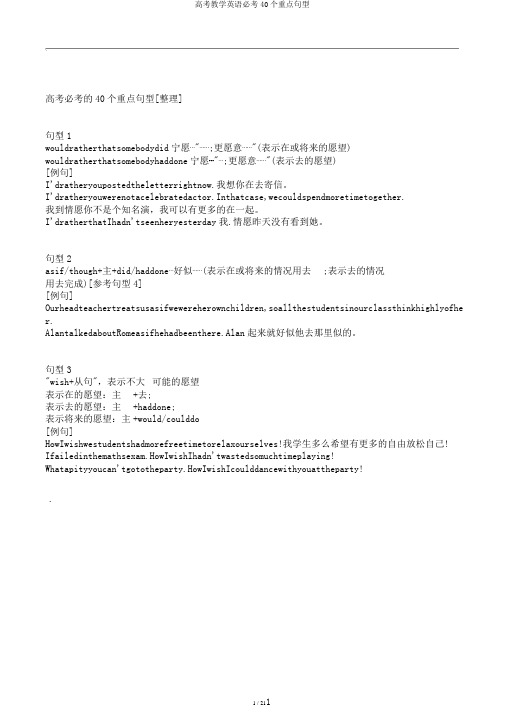
高考必考的40个重点句型[整理]句型1wouldratherthatsomebodydid 宁愿⋯"⋯⋯;更愿意⋯⋯"(表示在或将来的愿望) wouldratherthatsomebodyhaddone 宁愿⋯"⋯;更愿意⋯⋯"(表示去的愿望)[例句]I'dratheryoupostedtheletterrightnow.我想你在去寄信。
I'dratheryouwerenotacelebratedactor.Inthatcase,wecouldspendmoretimetogether.我到情愿你不是个知名演,我可以有更多的在一起。
I'dratherthatIhadn'tseenheryesterday我.情愿昨天没有看到她。
句型2asif/though+主+did/haddone⋯好似⋯⋯(表示在或将来的情况用去;表示去的情况用去完成)[参考句型4][例句]Ourheadteachertreatsusasifwewereherownchildren,soallthestudentsinourclassthinkhighlyofhe r.AlantalkedaboutRomeasifhehadbeenthere.Alan起来就好似他去那里似的。
句型3"wish+从句",表示不大可能的愿望表示在的愿望:主+去;表示去的愿望:主+haddone;表示将来的愿望:主+would/coulddo[例句]HowIwishwestudentshadmorefreetimetorelaxourselves!我学生多么希望有更多的自由放松自己! Ifailedinthemathsexam.HowIwishIhadn'twastedsomuchtimeplaying!Whatapityyoucan'tgototheparty.HowIwishIcoulddancewithyouattheparty!.→句型4It'shigh/abouttimethatsomebodydid(shoulddo)(should通常不省略) ⋯早就⋯⋯[例句]It'stimethatyouwenttoschool.=It'stimethatyoushouldgotoschool.It'shightimethatwedidsomethingtoimproveourenvironment.是我保做些事情了。
高中英语13个语法考点归纳
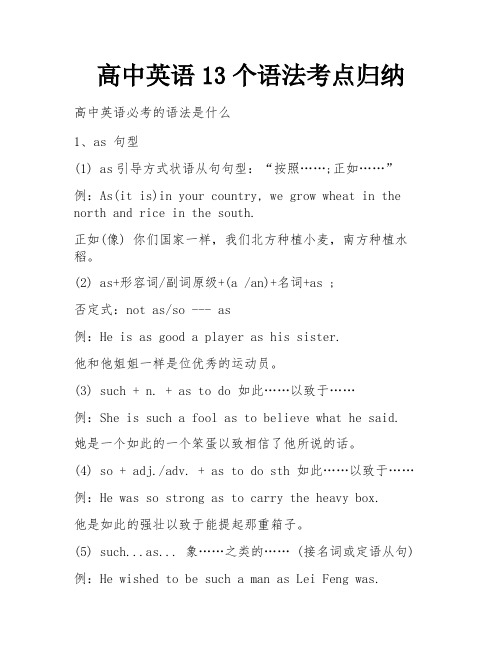
高中英语13个语法考点归纳高中英语必考的语法是什么1、as 句型(1) as引导方式状语从句句型:“按照……;正如……”例:As(it is)in your country, we grow wheat in the north and rice in the south.正如(像) 你们国家一样,我们北方种植小麦,南方种植水稻。
(2) as+形容词/副词原级+(a /an)+名词+as ;否定式:not as/so --- as例:He is as good a player as his sister.他和他姐姐一样是位优秀的运动员。
(3) such + n. + as to do 如此……以致于……例:She is such a fool as to believe what he said.她是一个如此的一个笨蛋以致相信了他所说的话。
(4) so + adj./adv. + as to do sth 如此……以致于……例:He was so strong as to carry the heavy box.他是如此的强壮以致于能提起那重箱子。
(5) such...as... 象……之类的…… (接名词或定语从句)例:He wished to be such a man as Lei Feng was.他希望成为一个像雷锋这样的人。
(6) the same +名词+as 和……一样的…… (接名词或定语从句)例:He is not the same man as he used to be.他不是从前的那样子了。
(7) as 引导非限制性定语从句例:As is known to us, knowledge is power.众所周知,知识就是力量。
(8)引导时间状语从句,与while意义相近例:We get wiser as we get older.随着我们长大,我们也变得越来越聪明。
(9) 引导原因状语从句,与 because的用法相近例:As it was getting very late, we soon turned back.因为越来越迟了,所以我们不久就回来了。
高考英语必考重点句型总结(40个)
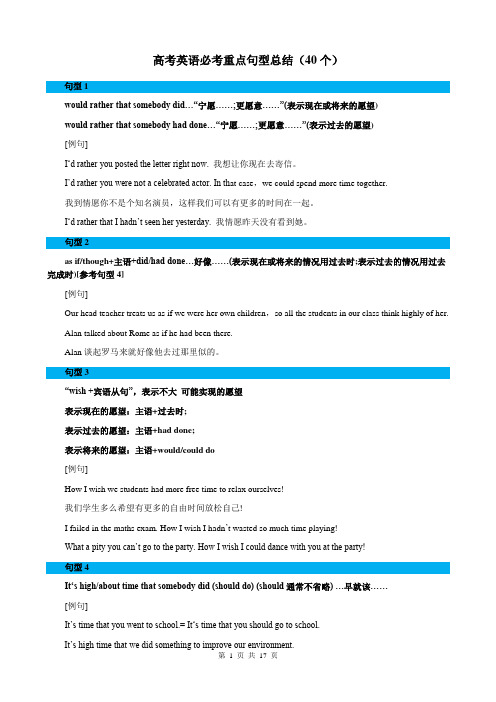
高考英语必考重点句型总结(40个)句型1would rather that somebody did…“宁愿……;更愿意……”(表示现在或将来的愿望)would rather that somebody had done…“宁愿……;更愿意……”(表示过去的愿望)[例句]I‘d rather you posted the letter right now. 我想让你现在去寄信。
I’d rather you were not a celebrated actor. In th at case,we could spend more time together.我到情愿你不是个知名演员,这样我们可以有更多的时间在一起。
I‘d rather that I hadn’t seen her yesterday. 我情愿昨天没有看到她。
句型2as if/though+主语+did/had done…好像……(表示现在或将来的情况用过去时;表示过去的情况用过去完成时)[参考句型4][例句]Our head teacher treats us as if we were her own children,so all the students in our class think highly of her.Alan talked about Rome as if he had been there.Alan谈起罗马来就好像他去过那里似的。
句型3“wish +宾语从句”,表示不大可能实现的愿望表示现在的愿望:主语+过去时;表示过去的愿望:主语+had done;表示将来的愿望:主语+would/could do[例句]How I wish we students had more free time to relax ourselves!我们学生多么希望有更多的自由时间放松自己!I failed in the maths exam. How I wish I hadn’t wasted so much time playing!What a pity you can’t go to the party. How I wish I could dance with you at the party!句型4It‘s high/about time that somebody did (should do) (should通常不省略) …早就该……[例句]It’s time that you went to school.= It‘s time that you should go to school.It’s high time that we did something to improve our environment.该是我们为环保做些事情了。
高考英语常用句型归纳整理
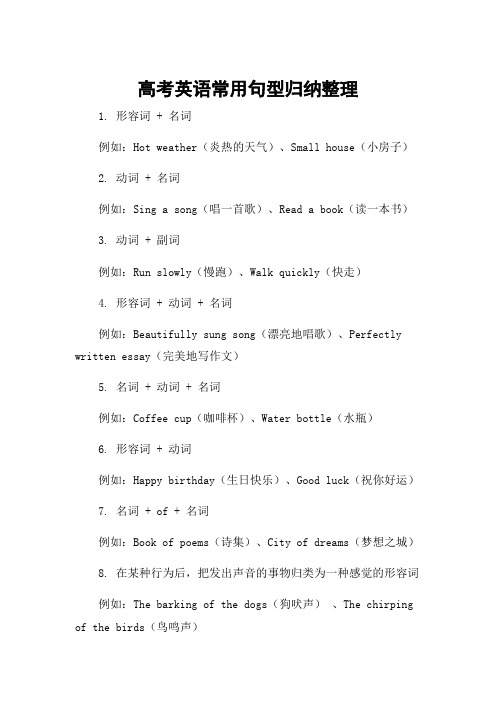
高考英语常用句型归纳整理
1. 形容词 + 名词
例如:Hot weather(炎热的天气)、Small house(小房子)
2. 动词 + 名词
例如:Sing a song(唱一首歌)、Read a book(读一本书)
3. 动词 + 副词
例如:Run slowly(慢跑)、Walk quickly(快走)
4. 形容词 + 动词 + 名词
例如:Beautifully sung song(漂亮地唱歌)、Perfectly written essay(完美地写作文)
5. 名词 + 动词 + 名词
例如:Coffee cup(咖啡杯)、Water bottle(水瓶)
6. 形容词 + 动词
例如:Happy birthday(生日快乐)、Good luck(祝你好运)
7. 名词 + of + 名词
例如:Book of poems(诗集)、City of dreams(梦想之城)
8. 在某种行为后,把发出声音的事物归类为一种感觉的形容词
例如:The barking of the dogs(狗吠声)、The chirping of the birds(鸟鸣声)
9. 表示过程的形容词 + 动词 + 名词
例如:Growing economy(繁荣的经济)、Improving skills (提高技能)
10. 名词 + preposition + 名词
例如:The roof of the house(房子的屋顶)、The top of the mountain(山顶)。
高考英语必考语法大汇总
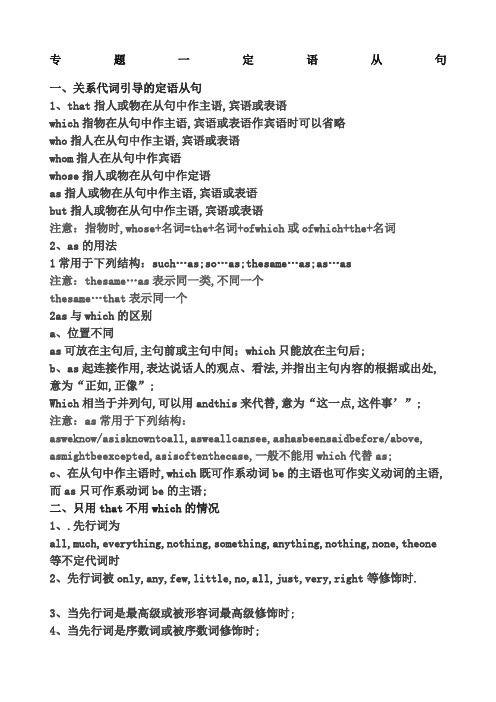
专题一定语从句一、关系代词引导的定语从句1、that指人或物在从句中作主语,宾语或表语which指物在从句中作主语,宾语或表语作宾语时可以省略who指人在从句中作主语,宾语或表语whom指人在从句中作宾语whose指人或物在从句中作定语as指人或物在从句中作主语,宾语或表语but指人或物在从句中作主语,宾语或表语注意:指物时,whose+名词=the+名词+ofwhich或ofwhich+the+名词2、as的用法1常用于下列结构:such…as;so…as;thesame…as;as…as注意:thesame…as表示同一类,不同一个thesame…that表示同一个2as与which的区别a、位置不同as可放在主句后,主句前或主句中间;which只能放在主句后;b、as起连接作用,表达说话人的观点、看法,并指出主句内容的根据或出处,意为“正如,正像”;Which相当于并列句,可以用andthis来代替,意为“这一点,这件事’”;注意:as常用于下列结构:asweknow/asisknowntoall,asweallcansee,ashasbeensaidbefore/above, asmightbeexcepted,asisoftenthecase,一般不能用which代替as;c、在从句中作主语时,which既可作系动词be的主语也可作实义动词的主语,而as只可作系动词be的主语;二、只用that不用which的情况1、.先行词为all,much,everything,nothing,something,anything,nothing,none,theone 等不定代词时2、先行词被only,any,few,little,no,all,just,very,right等修饰时.3、当先行词是最高级或被形容词最高级修饰时;4、当先行词是序数词或被序数词修饰时;5、当先行词是数词时.6、当先行词既指人又指物时;7、如有两个定语从句,其中一个关系代词已用which,另一个关系代词则宜用that;8、主句是Therebe结构,修饰其主语的定语从句宜用that作关系代词;9、被修饰成分为表语,或者关系代词本身是定语从句的表语时,该关系代词宜用that;10、先行词为what,关系代词用that;11、有时为了避免重复而使用that引导定语从句;三、只用which不用that的情况1、当介词放在关系代词之前时;2、在非限制性定语从句中;3、当关系代词指整个主句的概念时;四、只用who不用that的情况1、当先行词是one,ones,anyone或those时;2、therebe结构中;3、当先行词是人,后面有较长修饰语时;4、为了避免重复或引起歧义;5、当先行词是I,you,he,they等时常用于谚语中;6、先行词是指成员的集体名词;7、who可以引导非限制性定语从句;8、先行词是拟人化的名词;9、先行词指特定的人时用who,不指特定的人用that;五、关系副词引导的定语从句1、when时间状语注意:It/Ihis/That+be+thefirst/second/lasttimethat…只能用that,that 可以省略,从句用相应的完成时;2、where地点状语注意:当先行词为模糊的地点时,如,case,position,stage,scene,spot,activity,family,job等名词时用where.3、why原因状语先行词为reason;六、介词与关系代词1、介词如何确定1依据定语从句中动词的习惯搭配来确定2依据先行词的习惯搭配来确定3根据意思来确定4为了强调某一名词,不定式前加上关系词2、关系代词作介词的宾语时,介词的位置1whom和which可以和介词一起放在先行词和从句之间,也可以把介词放在从句中有关动词的后面;2含有介词的短语动词一般不拆开,介词仍放在动词的后面;3关系代词that在从句中作介词宾语时,介词不能放在它的前面,只能放在从句中有关动词的后面;4关系代词whose也可以在从句中与它所修饰的名词一起作介词宾语;3、“名词/数词/代词+介词+关系代词”结构常见的形式有:名词/one/two/some/none/all/both/several/many/most/afew/alittle/the+比较级/the+最高级…+of+which/whom;七、定语从句中的主谓一致1、关系代词作从句的主语时,从句中谓语动词的人称和数要与先行词保持一致,先行词是句子时,从句的谓语动词用单数形式;2、“oneof+复数名词”位于关系代词前作先行词时,关系代词在从句中作主语,从句的动词通常用复数,但当one前有the,theonly,thevery等修饰时,从句的谓语动词要用单数;八、注意way和time后接定语从句的情况1、当先行词是way,且意为“方式、方法”时,引导定语从句的关系词有下列三种形式:that/inwhich/不填;注意:关系词在从句中必须作状语;如果关系词在从句中作主语或宾语,按正常的定语从句分析;2、当先行词是time时,若time作“次数”讲,应用that引导定语从句,that 可省略;若time作“一段时间”讲,应用关系副词when或介词at/during+which引导定语从句;专题二状语从句一、时间状语从句1、when的用法1when既可引导一个持续性动作,也可引导一个短暂性动作,可用于表示主句和从句动作同时发生或从句动作先于主句动作,有时还可表示从句动作后于主句,意为“当;;;时候”;2when在beabouttodo;;;when;;;,bedoing;;;when;;;,haddone;;;when;;;,beonone’sway;;;when;;;,beonthepointofdoing;;;when;;;等结构中,作“那时突然”讲;3when“既然、鉴于;尽管,虽然位于主句之后;如果”2、while的用法1表示“当;;;时候”,引导的动作必须是延续性的;2用作并列连词,表示相对关系“然而”;3引导让步状语从句,相当于although,意为“虽然”,位于主句前;4引导条件状语从句,相当于as/solongas,意为“只要”;3、as的用法1表示“当;;;时候”,强调同时发生,不指先后;2说明两种正在发展或变化的情况,表示“随着”,表示时间的推移;3表示“一边;;;一边;;;”;4强调两个动作紧接着发生;5表示“虽然,尽管”;6其他含义“正如,正像”,“作为”,“由于,因为”;4、before的用法1一般意为“在;;;之前”“;;;才”,“;;;就”“还没有;;;”“免得”“不知不觉”“宁可,宁愿”,“否则,要不然”;2It+willbe/was+时间段+before+一般现在时/一般过去时;在肯定句中,意为“多长时间之后才”;在否定句中,意为“用不了多长时间就”;5、until和till1与肯定句连用,必须是延续性动词;2与否定句连用,必须是非延续性动词,表示“直到;;;才,在;;;之前不;;;”;注意:notuntil可用于强调句和倒装句强调句:Itis/wasnotuntil…that…倒装句:notuntil放句首时,主句要部分倒装;6、since的用法1since后是非延续性动词,时间起点从该动作发生算起,意为“做某事多久了”;since后是延续性动词,时间起点从该动作结束算起,意为“不做某事已有多长时间”;2Itis/hasbeen+时间段+since+一般过去时7、表示“一......就......”的句型1assoonas,once,immediately,directly,instantly,themoment,theminute等引导的从句都表示从句的动作一发生,主句的动作随即发生,常译作“一;;;就;;;”,这类从句中,经常用一般现在时态代替将来时态;2ondoingsth.或“onone’s+名词”作时间状语;8、有些名词和副词可以起连接词的作用,引导时间状语从句;注意:时间状语从句中不用将来时态;若要表示将来时间,可用一般现在时态表示;但when引导名词性从句时,从句中要使用将来时;二、地点状语从句1、地点状语从句由where,wherever引导;注意:where与where的区别:Where表特定的地点,而wherever表示非特定的地点;Wherever=to/atanyplacewhere2、地点状语从句与定语从句的区别Where引导定语从句时,从句前应有一个表示地点的名词作先行词;而状语从句前则无先行词;三、原因状语从句引导词:because,since,as,nowthat,notthat…,butthat…,seeingthat,considering that,inthat注意:for也可以表示原因,属并列连词,但不是说明直接原因,而是对某种情况加以推断,用于表示补充说明理由;四、目的状语从句引导词:so,sothat,inorderthat,that,totheendthat以便,为了,incase,forfearthat,lest以免,以防,目的状语从句中通常有情态动词can,could,may,might,should,would等;注意:1、incase还可表示“万一,假如”;2、目的状语从句可以用soasto,inorderto等不定式代替,但主句和从句的主语必须一致;五、结果状语从句引导词:so...that如此;;;以至于;;;,such...that如此;;;以至于;;;,sothat结果是,withtheresultthat所以,结果是注意:1so...that与such...that的区别So+形容词such+a/an+形容词+单数名词So+形容词+a/an+单数名词such+形容词+复数名词So+副词such+形容词+不可数名词Somany/few+复数名词Somuch/little+不可数名词2sothat引导的目的状语从句与sothat引导的结果状语从句目的状语从句一般使用情态动词,结果状语从句一般不使用情态动词;结果状语从句常常用逗号与主句分开;3so...that与so...as;such...that与such...asSo...that/such...that为结果状语从句;so...as/such...as为定语从句;六、条件状语从句引导词:if如果,unless除非,ifonly只要,但愿,onlyif只有,incase万一,suppose/supposingthat假设,provided/providingthat只要,假若,onconditionthat要是,在;;;条件下,so/aslongas只要,let's/letussay假设七、方式状语从句引导词:as像;;;一样,正如;;;,asif/asthough好像,宛如注意:1、固定句型AistoBwhatCistoD.意为“A对B而言正如C对D一样”;2、asif,asthough引导的从句若与事实相反,用虚拟语气;若与事实相符,不用虚拟语气;八、让步状语从句引导词:though/although/as虽然,尽管,evenif/though即使,尽管,whether/nomatterwhether...ornot不管;;;是否,不管是;;;还是wh-ever/nomatterwh-无论;;;注意:1though,although,as的区别A、Though,although的主句中可以用yet,still,nevertheless,但不可使用but;B、though引导的从句可以倒装,也可以不倒装;as引导的从句必须倒装;although引导的从句不能倒装;其结构为:形容词/分词/副词/动词原形/名词无冠词+as/though+主语+谓语……一、that从句1、主语从句1that从句作主语时,常用it作形式主语,常见的句型有:It+be+形容词obvious,true,natural,surprising,good,wonderful,funny,possible,likel y,certain,probable,etc.+that从句It+be+名词词组nowonder,anhonor,agoodthing,apity,nosurprise,etc.+that从句It+be+过去分词said,reported,thought,expected,decided,announced,arranged,etc.+that 从句2that可以省略,但that从句位于句首时,that不能省略;2、宾语从句1常见的可以接that从句作宾语的动词有see,say,know,imagine,discover,believe,tell,show,think,consider,besu re,beafraid等;在可以接复合宾语的动词之后,如think,make,consider等,可以用it作形式宾语;2That从句一般不能充当介词宾语,偶尔可作except,in的宾语;3、表语从句that不可省略4、同位语从句连词that引导同位语从句时,应在某些抽象名词之后,如:fact,hope,desire,thought,suggestion,idea,news,problem,possibility等,对前面的名词起补充说明的作用,that在从句中不担当任何成分,不能省略;二、whether/if从句1、在表语从句和同位语从句中只能用whether不能用if;当主语从句放于句首时,只能用whether不用if;当it作形式主语,主语从句放在句末时用whether或if均可;discuss后引导宾语从句时,必须用whether;2、在宾语从句中:1及物动词后:whether从句中不能有否定式,宾语从句为否定句时用if;if 不能与ornot连用,但可以用whetherornot;whether后可以加不定式;2介词后:只能用whether,不用if;三、特殊疑问词引导的从句1、主语从句:特殊疑问词引导主语从句时,常用it作形式主语;2、宾语从句1常见的能接特殊疑问词引导的宾语从句的动词有see,tell,ask,answer,know,decide,findout,imagine,suggest,doubt,wonde r,show,discuss,understand,inform,advise等;2作介词宾语;3、同位语从句、表语从句四、名词性关系从句What=thethingswhich/that,whoever=anyonewho,whichever=anyone/anythin gthat,whatever=anythingthat,where=theplacewhere,when=thetimewhen2、表示眼下或目前等现在时间所发生的动作或存在的状态,这种状态带有一定的持续性;3、表示客观事实或普遍真理;4、书报的标题,故事的叙述,小说、戏剧、电影等情节介绍,图片的说明等;5、时间表、时刻表、日程表、节目单、课程表等按规定将要发生的动作,只限于go,arrive,leave,start,stay,return,begin,come等动词;6、在时间、条件、方式、让步状语从句中,表示将来的动作;注意:一般现在时可以用于定语从句或宾语从句中表示将来;7、用在某些表达中,表示现在正在发生的动作或存在的状态; HerecomesthebusHowitrains二、一般过去时1、表示在过去某一时间点发生的动作或所处的状态,与现在没有关系;常用的时间状语有:yesterday,lastnight,atthattime等;2、表示在过去某一段时间里反复出现的动作或状态,与现在没有关系;3、用usedtodo或woulddo表示过去经常或反复发生的动作;4、有些情况发生的时间没清楚表明,但实际上是“刚才,刚刚”发生的,属于过去时间,应使用过去时态;常见的有Ididn’tknow…或Iforgot…等;5、一般过去时可与today,thisweek,thismonth等时间状语连用;三、一般将来时1、will/shalldo1表示将来会出现的动作或状态;常用的时间状语:thisevening,tomorrow,nextweek/month…,attheendofthisterm,inafewminu tes等;2表示将来经常发生的动作;3表示事物的固有属性或必然趋势、倾向;4表示说话过程中做出某种决定;注意:条件状语从句中的will表示“决心,意愿”,此时will是情态动词表示意愿;2、begoingtodo1表示已经决定或安排要做的事;2表示根据某种迹象认为在最近或将来将要发生的事;3、betodo1表示约定、计划或按职责、义务要求即将发生的动作;2表示说话人的意志、意图、职责、义务、命令;3表示注定要发生的事情;4、beabouttodo1表示即将发生的动作,意为“正要,即将”;2不可与表示具体的将来时间的副词或副词性短语连用,但可以同由as或when引导的时间状语从句连用;5、某些动词的现在进行时表示即将发生的动作;四、过去将来时1、would/shoulddo表示从过去某一时间来看将要发生的动作或将要存在的状态;通常用于其主句的谓语为过去时态的宾语从句中;2、were/wastodo表示过去将来时间的安排,如果这个安排后来被取消,没有实现,则用was/weretohavedone表示;五、现在进行时1、表示说话时正在进行而尚未完成的动作或状态;2、表示现阶段一直在进行的动作,但说话时不一定正在进行;3、有时可表示即将发生的动作只限于go,come,stay,leave,start,begin,arrive,return,fly,drive等动词,这时常有一个表示将来时间的状语;4、常与always,forever,constantly,continually,allthetime等时间副词连用,表示反复发生的或习惯性的动作,常表示不满、抱怨或赞赏等情感;5、有些表示感觉、情感的动词不能用进行时,它们是:know,understand,love,like,hate,feel,desire,wish,want,refuse,remembe r,hear,see,have等,这些动词一般不用进行时,通常用一般现在时态,表示说话时发生的动作;六、过去进行时1、表示过去某一时刻或某一时间内正在进行的动作;这一特定的过去时间通常有时间状语从句或由上下文来表示;2、表示过去某一阶段一直在进行的动作;但说话时不一定正在进行;3、表示从过去某一时间的角度看将要发生的动作,用于某些动词;见现在进行时34、与always,frequently等副词连用,表示感情色彩;七、将来进行时1、表示在将来某一时刻或某一时间段正在进行的动作;2、表示根据计划或安排在将来某一时刻正在进行的动作;此时一般有具体的时间状语;2、重复的动作表示感情色彩;表示一直到说话时为止的一段时间内一再重复的动作;3、现在完成时和现在完成进行时的区别1表示动作已完成,着重结果;现在完成进行时表示动作的进行,强调动作的持续性;2状态动词、知觉动词或情态动词如:see,feel,know,love等,不用于现在完成进行时,但可用于现在完成时;十、过去完成时1、表示在过去某一时刻或动作以前已经完成了的动作,即“过去的过去”;----|-----------|----------|-------->过去完成过去现在注意:在含有时间状语从句的复合句中,若两个动作紧接着发生,则不需用过去完成时,尤其是在含有before和after的复合句中,常用一般过去时代替过去完成时;2、表示未曾实现的希望、打算、意图、诺言等;常用hadhoped/planned/meant/intended/thought/wanted/expected等或用上述动词过去式接不定式表示即:hoped/planned…+todo;3、过去完成时用于hardly…when,nosooner…than等固定句型中;十一、不能用被动语态的情况1、therebe结构及所有的不及物动词或词组充当谓语时,无被动语态;2、系动词无被动语态;3、一些表示状态的及物动词,如cost,have,own,possess等不能用被动语态;4、表示“希望、意图”的动词,如wish,want,hope,like,love,hate等不能变被动语态;5、当及物动词leave,enter,reach等的宾语是表示地点和处所包括组织、团体、军队、国家等的名词时,不可变为被动语态;十二、主动形式表被动意义1、某些动词形式上主动,但含有被动意思,往往表示主语本身的性质,而且主语应该是事物;2、在“have+宾语+todo”结构中,当不定式的逻辑主语在句中出现时,不定式用主动语态,否则用被动语态;3、在“be+形容词+todo”中,不定式的逻辑宾语是句子的主语,用主动表被动;4、在某些词组中,用动词的主动形式表被动;1beworthdoing2want,require,need后面的动名词用主动形式表示被动含义;3with复合结构十三、被动形式表示主动意义的几种情况beseated坐着,behidden躲藏,belost迷路,bedrunk喝醉,bedressed穿着专题五情态动词一、can和could1、can的用法1表示体力和脑力方面的能力;2表示对现在的动作或状态进行主观的猜测,主要用在否定句和疑问句中;3表示可能性,理论上的可能性,意为“有时候可能会”,可用于肯定句;4表示允许,意思与may接近;5表示说话人的推测、怀疑、惊异、猜测或不肯定等,主要用于否定句、疑问句或感叹句中;6can的特殊句型cannot…too/enough表示“无论怎么;;;也不过分”;“越;;;越好”; cannotbut+dosth.表示“不得不,只好”;2、could的用法1表示能力,指的是过去时间;2表示允许,指的是过去时间;3表示可能,可以指过去时间,也可以指现在时间,表示语气缓和;4委婉客气地提出问题或陈述看法,指的是现在时间;主要用于疑问句,回答时用can;3、can与could的区别can表推测时只用于否定句和疑问句could无此限制;couldn’t的可能性比can’t小;4、can与beableto的区别1现在时:无区别,但后者不常用;2完成时;can没有完成时,此时要用havehas,hadbeenableto;3将来时:can没有将来时,要用willbeableto;4过去时:could表示一般能力,was/wereableto表示在具体场合通过努力成功做成某事的能力;二、may和might1、may的用法1表示询问或说明一件事可不可以做;2表示一件事或许会发生或某种情况可能会存在,通常用在肯定句和否定句中;注意:表示可能性时,can’t语气强,表示“不可能”,maynot语气弱,表示“可能不”;2、might的用法1表示询问或允许,指的是过去时间;2表示可能发生的事,可以指过去时间,也可以指现在时间,语气更加不肯定,可能性比may小一些;3、may与might的特殊用法1“may+主语+动词原形”表示祝愿;2“may/mightwell+动词原形”表示完全能,很可能;3“may/mightaswell+动词原形”表示最好,满可以,倒不如;4maybe是“情态动词+系动词be”结构,表示“可能有,可能在”,否定式为maynotbe;maybe是一个词,为副词,意为“大概,或许,可能”,在句中作状语;三、must的用法1、表示“必须”,多强调说话人的主观看法;2、must和haveto的区别:1must表示说话人的义务或说话人主观认为“必须,应当”做某事;haveto表示由于某种外界原因而“必须,不得不”做某事;即must侧重说明主观看法,haveto强调客观需要;2must只有一种形式,可用于现在、过去或将来时,但haveto有不同的形式,可用于不同的时态;3在否定句中,don’tneedto,don’thaveto,needn’t表示没有义务;mustn’t表示禁止;3、must的否定形式mustnot/mustn’t意为“不许,禁止”,表示绝对禁止;若表示“没必要,不必”,应使用needn’t或don’thaveto;注意:对must作否定回答时,不用mustn’t,用needn’t或don’thaveto;4、must表示“偏偏”,指令人不快的事情;5、must用来表示推测,意为i“准是,肯定是”,一般用于肯定句,肯定程度比may,might大的多;四、need的用法1、need用作情态动词,后面接动词原形,通常用在否定句和疑问句中;2、回答need时,肯定回答用must,否定回答用needn’t或don’thaveto;3、need用作实义动词时,有时态、人称和数的变化,后面加todo;4、needtodo和needdoingneedtodo中不定式的逻辑主语就是主句的主语;needdoing是主动形式表示被动含义,即need前的主语就是need后面的动词所表示的动作的承受者;注意:want和require作“需要”讲时,和need的用法相同;5、needn’thavedone与didn’tneedtodoneedn’thavedone表示过去本不必做但实际上却做了某事didn’tneedtodo表示过去不必做而实际上也没做某事五、dare的用法1、dare用作情态动词,后面接动词原形,通常用在否定句和疑问句和条件句中;它没有人称和数的变化,但有过去式dared;2、dare用作实义动词时,有时态、人称和数的变化,后面加todo;注意:1Idaresay意为“我认为,我相信,很可能”;2dare用作实义动词时,表示“敢冒危险,不俱”;3dare可用于激将或挑战;例:Hedaredmetojumpdown.六、will和would1、will的用法1可以表示主观意志、意愿,可用于各种人称;2可以表示经常性、习惯性、倾向性等,意为“经常,惯于,总是”;3表示命令说话这确信命令一定会得到执行或允诺;4will可用于祈使句的附加疑问句;5用于疑问句,表“邀请,请求”,常与第二人称you连用;2、would的用法1作为will的过去时态,用于过去时中,表示主观愿望或意志,意为“愿意,执意”;2用与第二人称,表示谦恭的请求或征求意见,比will更为客气;3表示过去的习惯,后接动词原形,意为“总是,总会”;4would表意愿用于词组中;Wouldlike“喜欢,想要”=wouldloveWouldrather“宁愿”;七、shall和should1、shall的用法1shall用于第一、三人称陈述句中,表示说话人征求对方的意见或向对方请示; 2shall用于第二、第三人称陈述句中,表示说话人给对方的命令、警告、允诺或威胁;3用于所有人称,表示规章、法令、预言等,可译为“必须”;2、should的用法1表示义务、责任或劝告、建议、命令等,意为“应该”;2表示有一定根据的推测、推论或可能性,意为“可能,该”肯定的语气没有must表推测时强;3多用于疑问句中,表示惊讶、难以相信或不应该的事;4oughtto和should的比较A、oughtto也可以表示推论、可能性,和should用法一样;B、在省略回答中,oughtto中的to可以省略;C、should和oughtto表示做正确的事情或理应做的事情;besupposedto意为“被期望,应该”,表示被期望发生或根据安排、要求做某事,或认为做某事是正常的;八、hadbetter意为“最好”,’dbetter为其缩写形式,其后续跟动词原形;注意:hadbetter的否定形式hadbetternot;九、usedto“过去常常”,仅用于过去时态中,通常用于所有人称;1、usedto+动词原形,表示过去有规律的习惯或过去某一时期的的状况,但现在已不存在;2、其反意疑问句简略回答中,也有两种形式:didn’t,usedn’t3、usedto和would的区别1usedto可表示过去经常发生的动作或存在的状态,而would仅表示过去习惯性或重复性的动作;2usedto强调过去的行为同现在的对比,含有“过去如此,现在已不再这样了”之意;Would仅表示过去习惯性动作,没有预先在对比的含义;3usedto不能跟表确定时间短的时间状语连用;4usedto可用于无人称句和存在句,而would则不可;4、usedto与beusedtodo和beusedtodoing1usedto表示“过去常常”隐含现在不这样了,其中to是不定式符号,后跟动词原形,仅用于过去时态;2be/get/becomeusedto表示“习惯于”时,意为“变得习惯于“或“开始习惯于”;3beusedtodo表示“被用来”;十、情态动词后的某些动词形式1、情态动词+havedone1“must+have+done”表示对过去事情的肯定推测,译成“一定做过某事”,该结构只用于肯定句;2“can't+have+done”表示对过去事情的否定推测,译成“不可能做过某事”; 3“can+have+done”表示对过去行为的怀疑,用于疑问句,译成“可能做过……吗”4“could+have+done”是虚拟语气,表示对过去事情的假设,意思是本来能够做某事而没有做;5“may+have+done”表示对发生过的事情的推测,意思是“可能已经”或“也许已经”,用于肯定句中;6“might+have+done”表示对过去事情的推测,might与may意思相同,多用于虚拟语气结构中;还可以表示“本来可能……”;7“would+have+done”虚拟语气,表示对过去事情的假设,意思是“本来会做”;8“should+have+done”意思是“本来应该做某事,而实际没做;”“shouldn't+have+done”表示本来不应该做某事,而实际做了;含有指责对方或自责的含意;9“oughtto+have+done”表示过去应该做而实际并没有做,译成“理应做……”,往往表示遗憾;与“should+have+done”用法基本一样;10“need+have+done”表示本来需要做某事而没有做;“needn't+have+done”则表示“本来不需要做某事而做了”;2、情态动词+bedoing:表示对现在正在做的事情的推测;十一、含有某些情态动词的反意疑问句1、must当must表示命令时,反意疑问句用needn’t;当must表示推测时,反意疑问句与实际情况保持一致,即与把must删掉后的陈述句的反意疑问句保持一致;2、can’t当can’t表示没能力做某事时,反意疑问句用cansb.当can’t用于表推测时,反意疑问句由实际情况决定,即由去掉can’t后的真实陈述句决定;。
高考英语常用句型(1-5)

高考英语常用句型(1-5)1.否定句型1)一般否定句I don't know this. No news is good news.There is no person (smoking)/ not a person/ not any person (smoking) in the house.2)特指否定She went to his office, not to see him.I am sorry for not coming on time.I don't think/ believe/ suppose/ feel/ imagine you are right.3)部分否定All is not gold that glitters.I don't know all of them.I can't see everybody/everything.Both of them are not right.4)全体否定None of my friends smoke.I can see nothing/nobody.Neither of them is right.Nothing can be so simple as this.5)延续否定You didn't see him, neither/nor did I.You don't know, I don't know either.He doesn't know English, let alone/ to say nothing of/ not to speak of (更不用说)French.6)半否定句We seldom/ hardly/ scarcely/ barely hear such fine singing.I know little English. I saw few people.7)双重否定You can't make something out of nothing.What's done cannot be undone.There is no sweet without sweat.No gain without pains.I can't help /keep/ laughing whenever I hear it.8)排除否定Everyone is ready except you.He did nothing but play.But for your help, I couldn't have done it.9)加强否定Whatever you say, I won't do it at all.I can't see it any more, though I have looked for it everywhere.He is now a man. He is no longer a boy.2.判断句型1)一般判断句It is important for us to learn English.It is kind of you to help me. Sincere means honest.The boy is called/ named Tom.We regarded/consider it as an honor.2)强调判断It is English that we should learn.It is he who helped me a lot.3)弱式判断Your sentence doesn't sound/ look/ appear/ feel right.You look/ seem as if/ as though you had been there before.Maybe/ Perhaps she is ill.It is possible that he hasn't grasped what you have said.4)注释判断He can remember so many English words, that is (to say) he is a living dictionary(活字典).5)正反判断That sounds all right, but in fact it is on the contrary/ it is not.6)比较判断It is more a picture than a poem.He or you are wrong.Either he is right or I am.3.祝愿祈使句式1)一般句式Study hard and keep fit.2)强调句式Do tell me. It's no need to keep it a secret.Never tell a lie. You should be an honest boy.3)委婉祈使句Please tell me the truth.Would/Will/Won't do me a favor?Would/Do you mind my smoking?What/How about going on foot?4) 建议祈使句Let us go. Let us know the time.Let's not waste the time.You'd better start early.Shall we listen to some music?Why don't you get something to drink?Suppose/ Supposing you pick me up at about six?I suggest we (should) take the train instead of a bus.5)祝愿句Success to you!Wish you a good journey.May you have a happy marriage?Allow me to propose a toast to our friendship!4.数词句型1)表数目It is exactly ten o'clock/ It's ten o'clock sharp.It is five miles away from here.He is more than/over/ at least/not less than 20.He is under/ at most/no more than 20.2) 表年月日He was born on April 22 1994/in 1994 on the morning of Oct.1.3) 表年龄He is 20 years old/ years of age.He is at the age of 10.He is in his teens/ twenties/ thirties/...4) 表倍数It is four times that of last years.This is four times as big (again) as that one.This is four times bigger than that one.The income is double what it was.The output of coal was 200% greater than in 1998.5) 表计量It is 10 meters long/ wide/ high. / 10 meters in length/ width/ height. It costs me 100 yuan.I spent 10 hours finishing it.It took me 10 days to finish it.It is worth 100 yuan.5.关联指代句型1) 两项关联I have two books, one is Chinese; the other English.I have five books, one is Chinese; the others English.To say is one thing, but/ and to do is another.On (the) one hand, I am your teacher, and on the other hand, I am also your friend.Some like to play football, others are fond of basketball.2) 先后顺序First/ Firstly, I wish good health, second/secondly success in your study, third/ thirdly good luck in everything.First stop, then look, finally cross.At first/ In the beginning he works hard. Later/ Afterwards he is not so diligent.3) 修饰限制This is the same book as I lost yesterday.This is the same book that I lost yesterday. (同一本书)Don't trust such a man as over praise you.He/ One/ Those/ They who should come failed to appear.A man/ A person/ The one/ Anyone/ People who saw her liked her very much.The day/ time/ moment will come when China is the strongest in the world.4)两项连接He can speak not only English but also French.The book is both interesting and instructive.It is neither cold nor hot.Please either come in or go out.The old worker has experience and knowledge as well.5) 加和关系Besides literature, we have grammar and writing.Apart from oxygen, there are some other gases in the air.In addition to“if”, there are many other conjunctions that can introduce conditional clauses.I must go now, incidentally, if you want that book.You seem to like tea, so do I.。
高考英语短语句型总结大全
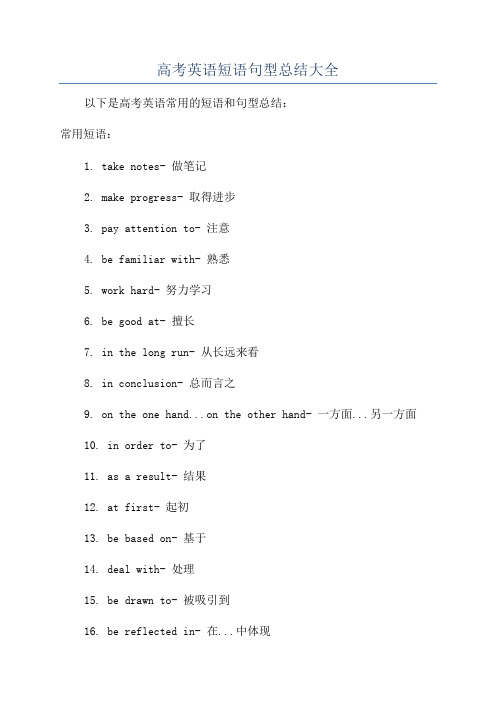
高考英语短语句型总结大全以下是高考英语常用的短语和句型总结:常用短语:1. take notes- 做笔记2. make progress- 取得进步3. pay attention to- 注意4. be familiar with- 熟悉5. work hard- 努力学习6. be good at- 擅长7. in the long run- 从长远来看8. in conclusion- 总而言之9. on the one hand...on the other hand- 一方面...另一方面10. in order to- 为了11. as a result- 结果12. at first- 起初13. be based on- 基于14. deal with- 处理15. be drawn to- 被吸引到16. be reflected in- 在...中体现17. be satisfied with- 对...满意18. be worried about- 担心19. adapt to- 适应20. take advantage of- 利用常用句型:1. It is widely believed that...- 广泛认为...2. It is important for sb. to do sth.- 对于人来说做事很重要。
3. What is more, ...- 而且...4. Not only... but also...- 不仅...而且...5. It is said that...- 据说...6. The reason why...is that...- ...的原因是...7. It goes without saying that...- 不言而喻...8. There is no doubt that...- 毫无疑问...9. From my point of view...- 从我的观点来看...10. On the whole, ...- 总的来说...11. To sum up, ...- 总而言之...12. In conclusion, ...- 最后...13. It is necessary for sb. to do sth.- 对于人来说做事是必要的。
高中英语高考特殊句式知识点汇总(共五大类)

高考英语特殊句式汇总一、强调句型句型结构形式:It is/was…that/who…be的时态:that/who前面be的时态一般是一般现在时,当它后面的句子为过去时时,才用过去时。
判断方法:将(It is/was)...(that/who)…括号中的词同时去掉,看剩下的部分是否仍然成立。
若成立,则是强调句型;若不成立,则为状语从句、定语从句或主语从句。
They met the manager in the coffee shop the other day.*It was they that / who met the manager in the coffee shop the other day.*Was it they that / who met the manager in the coffee shop the other day?*Who was it that met the manager in the coffee shop the other day?*I wonder who it was that met the manager in the coffee shop the other day.*Can it be in the coffee shop where they once had a cup that they met the manager.* --- Who is making such noise downstairs?--- It is the children.二、祈使句祈使句的主语是you,但一般被省略;当前面有呼语时,一般得补出主语;否定式一般是在前面加Don’t,或是Never。
**在“祈使句,+ and/or/and then+句子”句型中,当祈使句中含有比较级时,可将祈使句中的谓语部分省略,只留下“比较级或比较级与名词,+and/or/and then+句子”。
英语高考句式整理
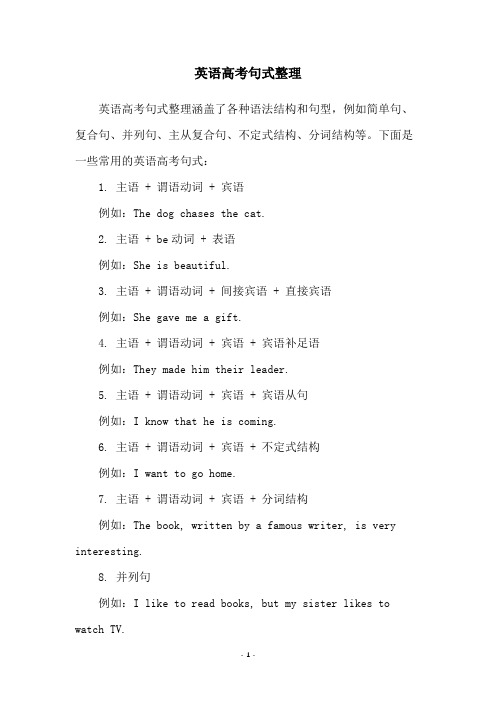
英语高考句式整理
英语高考句式整理涵盖了各种语法结构和句型,例如简单句、复合句、并列句、主从复合句、不定式结构、分词结构等。
下面是一些常用的英语高考句式:
1. 主语 + 谓语动词 + 宾语
例如:The dog chases the cat.
2. 主语 + be动词 + 表语
例如:She is beautiful.
3. 主语 + 谓语动词 + 间接宾语 + 直接宾语
例如:She gave me a gift.
4. 主语 + 谓语动词 + 宾语 + 宾语补足语
例如:They made him their leader.
5. 主语 + 谓语动词 + 宾语 + 宾语从句
例如:I know that he is coming.
6. 主语 + 谓语动词 + 宾语 + 不定式结构
例如:I want to go home.
7. 主语 + 谓语动词 + 宾语 + 分词结构
例如:The book, written by a famous writer, is very interesting.
8. 并列句
例如:I like to read books, but my sister likes to watch TV.
9. 主从复合句
例如:She will come if it doesn't rain.
以上是英语高考句式的一些常见形式,考生们要熟练掌握这些语法结构,以便在高考中能够准确、流畅地表达自己的思想。
高考英语常用短语和句型归纳总结

高考英语常用短语和句型归纳总结1. It is well known that...(众所周知)2. It is believed that...(人们认为)3. It is reported that...(据报道)4. It can be seen from the passage that...(从文章可以看出)5. According to the author/ the passage/ the data...(根据作者/文章/数据)6. In my opinion/ view/ point of view...(在我看来)7. As far as I'm concerned...(就我而言)8. It is obvious/ clear/ evident that...(很明显)9. I couldn't agree more/ less.(我完全同意/不同意)10. On the one hand, on the other hand...(一方面,另一方面)11. What's more/ Furthermore/ Moreover... (而且)12. In conclusion/ To sum up/ In a word...(总而言之)13. It is of great importance/ crucial/ significant/ essential to...(对于...是非常重要的)14. It is advisable/ advisable/ recommended to...(建议/推荐)15. There is no doubt that...(毫无疑问)16. It goes without saying that...(不言而喻)17. It seems that...(看起来好像)18. It turns out that...(结果是)19. It plays a vital role in...(在...中起着重要作用)20. It remains to be seen whether...(有待观察...是否)21. It is worth mentioning that...(值得一提的是)22. It is high time that...(早该是时候了)23. It is a common belief that...(普遍认为)24. It is the key to...(是...的关键)25. No matter what happens, we should...(无论发生什么,我们应该)。
- 1、下载文档前请自行甄别文档内容的完整性,平台不提供额外的编辑、内容补充、找答案等附加服务。
- 2、"仅部分预览"的文档,不可在线预览部分如存在完整性等问题,可反馈申请退款(可完整预览的文档不适用该条件!)。
- 3、如文档侵犯您的权益,请联系客服反馈,我们会尽快为您处理(人工客服工作时间:9:00-18:30)。
2012届高考英语专题总复习常用句型归纳1. It作先行主语和先行宾语的一些句型She had said what it was necessary to say.2. 强调句型It is not who rules us that is important, but how he rules us.3. "All+抽象名词"或"抽象名词+itself"(very+形容词)He was all gentleness to her.4. 利用词汇重复表示强调考试就上考试大A crime is a crime a crime.5. "something(much)of"和"nothing(little)of""something of"相当于"to some extent",表示程度。
在疑问句或条件从句中,则为"anything of",可译为"有点","略微等。
""译为毫无","全无"。
"much of"译为"大有","not much of"可译为"算不上","称不上","little of"可译为"几乎无"。
something like 译为"有点像,略似。
They say that he had no university education, but he seems to be something ofa scholar.6. 同格名词修饰是指of前后的两个名词都指同一个人或物,"of"以及它前面的名词构一个形容词短语,以修饰"of"后面的那个名词。
如"her old sharper of a father",可译为:"她那骗子般的父亲"。
Those pigs of girls eat so much.1. as…as…ca n(may)beIt is as plain as plain can be.2. "It is in(with)…as in(with)"It is in life as in a journey.3. "as good as…"相等于,就像,几乎如;实际上,其实,实在。
The merchant as good as promised the orphan boy, that he would adopt him.4."many as well…as"和"might a s well …as" "manyas well…as"可译为"与其……,不如……,更好","以这样做……为宜","如同……,也可以……"等等。
"might as well…as"表示不可能的事,可译为"犹如……","可与……一样荒唐","与其那样不如这样的好"等等。
One may as well not know a thing at all as know it imperfectly.5."to make…of"的译法(使……成为……,把……当作)I will make a scientist of my son.6. too…+不定式",not(never)too…+不定式","too…not+不定式She is too angry to speak.1. only(not, all, but, never) too …to do so 和"too ready (apt) + to do"结构中,不定式也没有否定意义,凡是"not","all""but等字后+"too…to,"不定式都失去了否定意义,在"too ready(apt) +to do"结构中,不定式也没有否定意义。
You know but too yell to hold your tongue.2. "no more …than…"句型考试大论坛A home without love is no more a home than a body without a soul is a man.3. "not so much…as"和"not so much as …"结构,"not so much…as"="not so much as …",其中as有进可换用but rather,可译为:"与其说是……毋须说是……"。
而"not somuch as"="without(not)even,"可译为"甚至……还没有"。
The oceans do not so much divide the world as unite it.4. "Nothing is more…than"和"Nothing is so …as"结构,"Nothing is more…than"和"Nothing is so …as"都具有最高级比较的意思,"Nothing I"可换用"no","nobody","nowhere","little","few","hardly","scarcely"等等,可译为"没有……比……更为","像……再没有了","最……"等。
Nothing is more precious than time.5. "cannot…too…"结构,"cannot…too…"意为"It is impossible to overdo…"或者,即"无论怎样……也不算过分"。
"not"可换用"hardly","scarcely"等,"too"可换用"enough","sufficient"等。
You cannot be too careful.6. "否定+but "结构,在否定词后面的"but",具有"which not","who not","that not",等等否定意义,构成前后的双重否定。
可译成"没有……不是"或"……都……"等。
Nothing is so bad but it might have been worse.1. "否定+until (till)"结构,在否定词"no","not","never","little","few","seldom"等的后边所接用的 "until/ till",多数情况下译为"直到……才……","要……才……",把否定译为肯定。
Nobody knows what he can do till he has tried.2. "not so…but"和"not such a …but"结构,这两个结构和"否定+but"的结构差不多,不同之点是这两个结构中的"but"是含有"that…not"意味的连续词,表示程度。
可译为"还没有……到不能做……的程度","并不是……不……","无论怎样……也不是不能……"等。
He is not so sick but he can come to school.3. "疑问词+should…but"结构,这个结构表示过去的意外的事,意为"none…but",可译为"除了……还有谁会……","岂料","想不到……竟是……"等。
Who should write it but himself?4. "who knows but (that)…"和"who could should…but"结构,这个结构是反问形式,一般意译为"多半","亦未可知"等等,有时也可直译。
Who knows but (that) he may go?5. "祈使句+and"和"祈使句+or"结构,"祈使句+and"表示"If…you…","祈使名+or"表示"if…not…,you。
6. "名词+and"结构,在这个结构中,名词等于状语从句,或表示条件,或表示时间。
A word, and he would lose his temper.1. "as…,so…"结构,这里的"so"的意思是"in the same way"(也是如此)。
此结构表明两个概念在程度上和关系上相似。
